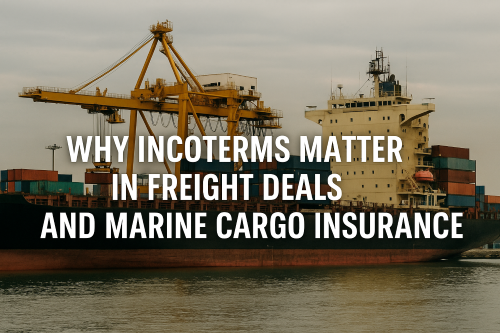When it comes to international trade, Incoterms aren’t just shipping jargon—they’re commercial strategies in disguise.
Whether you’re a seller exporting out of Vietnam or a Singaporean importer receiving goods at Tuas Port, the Incoterm you use impacts everything: customs clearance, who arranges marine cargo insurance, and even how much control you have over the freight journey.
But why are different deals done using different Incoterms in the first place? Let’s break it down practically—with real-life trade setups—and uncover how buyers and sellers use Incoterms to their advantage.
Why Do Incoterms Exist?
Incoterms (short for International Commercial Terms) were introduced to remove confusion in cross-border trade. They clarify who’s responsible for the shipment at each stage—when risk passes from seller to buyer, who arranges shipping, and who handles insurance.
But behind the scenes, there are real-world reasons why Incoterms like FOB and CIF are more popular than others like EXW or DAP, especially for sea freight.
In many countries:
- Sellers and buyers must go through licensed freight forwarders or brokers to declare shipments to customs.
- Appointing a new forwarder (especially under EXW or DAP) can mean extra paperwork, time, and cost.
- Many exporters have long-term relationships with their local freight forwarders and don’t want to hand over that control.
- Larger sellers or buyers often have better shipping rates than their counterpart—and they leverage that to include freight or insurance into the selling price.
So, yes, Incoterms help define responsibility. But they’re also used tactically, based on who has the better setup for managing freight and risk.
Real-World Scenarios: Why Certain Incoterms Make Business Sense
EXW (Ex Works)
This is the most hands-off approach for sellers. You pick up the goods from their warehouse—they don’t handle freight, insurance, or customs.
Best when:
- Seller is focused on local sales and only exports occasionally
- Buyer has strong control of logistics
- Buyer arranges marine cargo insurance from door-to-door
FCA (Free Carrier)
Seller brings goods to the buyer’s forwarder at the origin. Often used when factories are far from the port, and sellers have their own delivery fleets.
Best when:
- Seller wants to ensure export compliance (e.g., to qualify for tax refunds)
- Buyer takes over once goods reach the warehouse of their appointed freight forwarder
FOB (Free on Board)
The seller handles everything up to the port and loading onto the vessel. Risk transfers to the buyer once goods are onboard.
Best when:
- Seller exports regularly and has good local shipping rates
- Buyer prefers to control international shipping and handle their own cargo insurance from the port onward
CIF (Cost, Insurance & Freight)
Seller handles everything until the goods arrive at the buyer’s destination port. CIF includes marine cargo insurance—but usually only the minimum cover.
Best when:
- Seller ships high volumes and gets good freight discounts
- Seller can “bundle” freight and insurance into their selling price and even earn a small margin on it
- Buyer prefers convenience, but should consider topping up the insurance coverage
DAP (Delivered at Place)
Seller handles everything until the cargo reaches the buyer’s door, excluding duties and taxes.
Best when:
- Buyer is a small business or individual (B2C eCommerce, for example)
- Seller consolidates many small shipments into one
- Insurance needs to cover the full route up to the buyer’s address
How Does This Affect Marine Cargo Insurance?
Every Incoterm shifts the point of liability—so your cargo insurance should match that.
Buyers using EXW or FOB? Your policy should start from the moment goods leave the seller’s premises or get onboard.
Sellers using CIF? You’re responsible for arranging marine cargo insurance. But are you offering minimum coverage, or do your clients expect more?
Using DAP for B2C? Make sure your coverage includes the final delivery leg, especially if using last-mile logistics providers.
That’s why working with a reliable freight forwarder in Singapore makes a big difference. The right partner can help you align your Incoterms with the right insurance setup—so you’re not left exposed.
Want More on Marine Cargo Risk?
Check out this related article:
How Incoterms Affect Your Marine Cargo Insurance Policy
Or browse all cargo-related guides here:
Cargo Insurance Insights
Need Help Choosing the Right Incoterm or Cover?
If you’re unsure which Incoterm suits your deal—or want to make sure your marine cargo insurance is sufficient—reach out directly:
Contact Us Here


